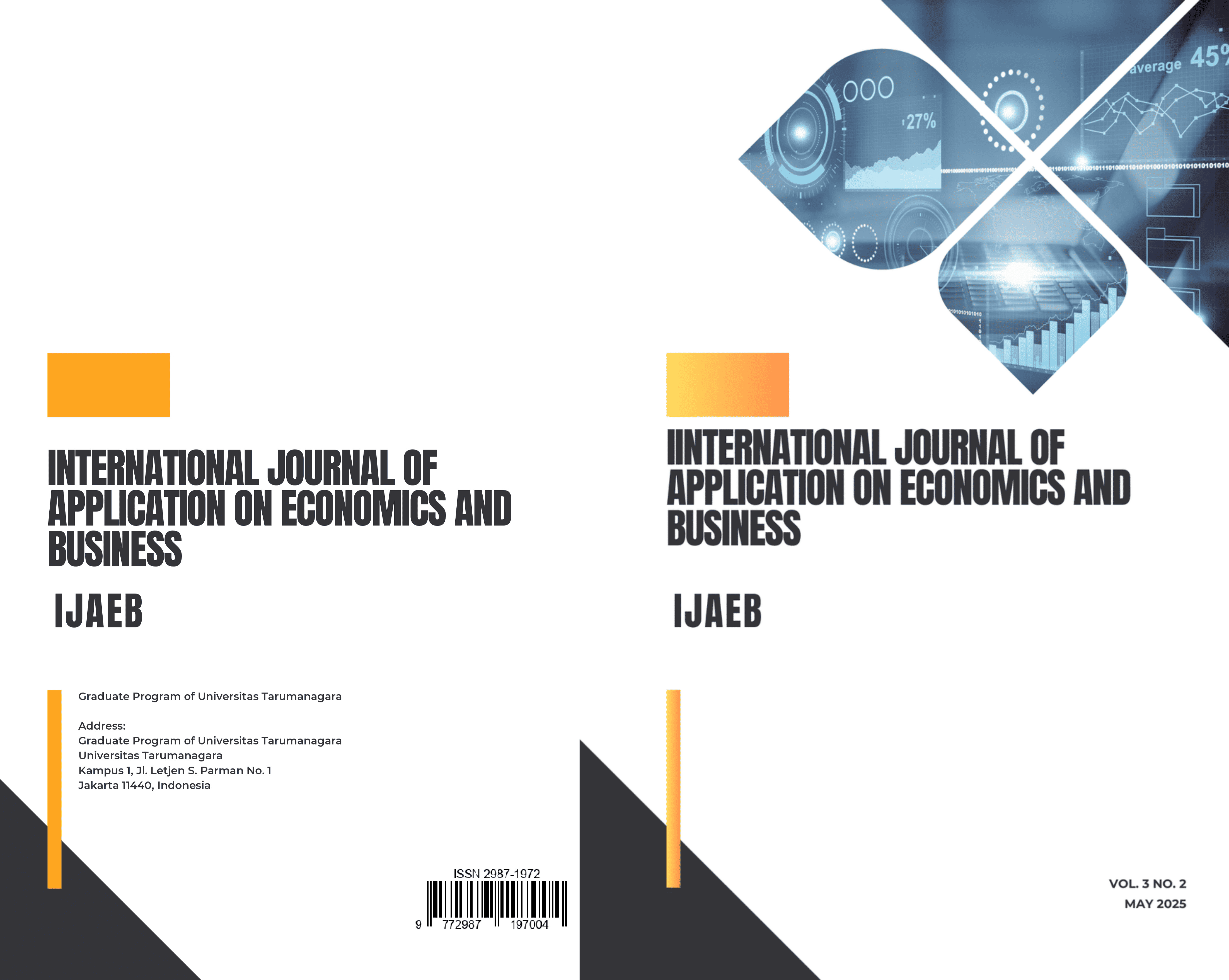DRIVING FASHION MSMES SUCCESS: A LOOK AT WOMEN ENTREPRENEURS MINDSET, MOTIVATION, AND STRATEGY
Main Article Content
Abstract
This study examines the influence of entrepreneurial mindset and entrepreneurial motivation on the success of women’s fashion MSMEs in Central Jakarta, with business strategy serving as a moderating variable. Employing a descriptive quantitative approach with purposive sampling, the study involves 306 respondent who are owners of women’s fashion MSMEs. Data analysis was conducted using Partial Least Square-Structural Equation Modeling (PLS-SEM) to evaluate the relationships between variables. The findings indicate that an entrepreneurial mindset has a positive and significant impact on the success of women’s fashion MSMEs in Central Jakarta. Similarly entrepreneurial motivation positively and significantly influences business success. Business strategy also demonstrates a positive and significant effect on success while moderating the relationship between entrepreneurial mindset and business success. However, business strategy as a moderator in the relationship between entrepreneurial motivation and business success shows a negative but significant influence, highlighting the need to align strategies with individual entrepreneurial motivation. These results suggest that MSMEs entrepreneurs can enhance business success by cultivating an innovation driven mindset, growth orientation, and risk-taking ability. Strong entrepreneurial motivation drives concrete actions toward business development, enabling entrepreneurs to remain focused despite challenges. The implications of this study emphasize the importance of improving entrepreneurial skills, aligning strategies with motivations, and fostering resilience to achieve sustained success. Women’s fashion MSME entrepreneurs are encouraged to maximize their business potential and succeed in a competitive market environment.
Article Details
Section

This work is licensed under a Creative Commons Attribution-NonCommercial-ShareAlike 4.0 International License.
This journal provides immediate open access to its content on the principle that making research freely available to the public supports a greater global exchange of knowledge.
IJAEB by Graduate Program of Universitas Tarumanagara is licensed under a Creative Commons Attribution-NonCommercial-ShareAlike 4.0 International License.. Permissions beyond the scope of this license may be available at https://journal.untar.ac.id/index.php/ijaeb
References
Achi, A. (2024). Directors’ exposure and social enterprise performance: does entrepreneurial mindset and financial resource availability matter? International Journal of Entrepreneurial Behaviour and Research. https://doi.org/10.1108/IJEBR-10-2023-1105
Ajzen, I. (1991). The theory of planned behavior. organizational behavior and human decision processes, 50(2), 179-211. https://doi.org/10.1016/0749-5978(91)90020-T
Ersarı, G., & Naktiyok, A. (2022). The role of competitive strategies in the effect of entrepreneurial mindset and the entrepreneurial leadership on business performance. istanbul business research, https://doi.org/10.26650/ibr.2022.51.834294
Gula, V. E., & Mulyani, S. D. (2020). Pengaruh capital intensity dan deferred tax expense terhadap tax avoidance dengan menggunakan strategi bisnis sebagai variabel moderasi. Prosiding Seminar Nasional Pakar, 2012, 1–7. https://doi.org/10.25105/pakar.v0i0.6882
Hartato, F., & Handoyo, S. E. (2021). Pengaruh orientasi kewirausahaan, orientasi pasar, dan strategi bisnis terhadap kinerja bisnis kuliner. Jurnal Manajerial Dan Kewirausahaan, 3(4), 980. https://doi.org/10.24912/jmk.v3i4.13471
Hedy Syahidah Budiarti, R. (2023). Manajemen Pemasaran Global Dalam Meningkatkan Kepuasan Konsumen dan Keberhasilan Bisnis. Coopetition : Jurnal Ilmiah Manajemen, 14(2), 405–416. https://doi.org/10.32670/coopetition.v14i2.3763
Irwanto Anthony, & Ie Mei. (2023). Pengaruh efikasi diri, pengetahuan kewirausahaan, motivasi kewirausahaan terhadap keberhasilan usaha umkm f&b di jakarta barat. Jurnal manajerial dan Kewirausahaan, 05(01), 259–267.
Iskandar, K. A., & Safrianto, A. S. (2020). Pengaruh keterampilan wirausaha dan pengalaman usaha terhadap keberhasilan kewirausahaan. Jurnal Ekonomi dan Industri, 21(1), 14–20. https://doi.org/10.35137/jei.v21i1.403
Junaidi, J., Anwar, S. M., & Sahrir, S. (2023). The role of religion and social capital on entrepreneurship self-efficacy and motivation among students in indonesia. Cogent Business and Management, 10(3), 1–22. https://doi.org/10.1080/23311975.2023.2265091
Nasution, A. M. U., Lailikhatmisafitri, I., & Marbun, P. (2021). Keberhasilan usaha kuliner dilihat dari faktor karakteristik dan pengetahuan kewirausahaan (studi kasus usaha kuliner ayam penyet). Journal of Education, Humaniora and Social Sciences (JEHSS), 3(3), 1219–1229. https://doi.org/10.34007/jehss.v3i3.528
Özsungur, F. (2019). The effects of technology acceptance and use behaviour on women’s entrepreneurship motivation factors. Asia Pacific Journal of Innovation and Entrepreneurship, 13(3), 367–380. https://doi.org/10.1108/apjie-09-2019-0070
Pasaribu, R. D., Shalsabila, D., & Djatmiko, T. (2023). Revamping business strategy using business model canvas (bmc), swot analysis, and tows matrix. Heritage and Sustainable Development, 5(1), 1–18. https://doi.org/10.37868/hsd.v5i1.125
Rahim Chang, A. A., Qureshi, J. A., Najib, S., & Salman, F. (2021). Learning the Chinioti way: exploring the legacy of a family business community leaders’ success based on the entrepreneurial mindset and values of Chinioti Sheikhs. 3C Empresa. Investigación y pensamiento crítico, 10(3), 109–135. https://doi.org/10.17993/3cemp.2021.100347.109-135
Ranaei Kordshouli, H. A., & Maleki, B. (2023). Entrepreneurship motivation and institutions: system dynamics and scenario planning. Journal of Global Entrepreneurship Research, 13(1). https://doi.org/10.1007/s40497-023-00348-2
Rong, K., & Liu, R. (2024). Why do chinese multinationals in south africa get benefits from digital business strategy? South African Journal of Economic and Management Sciences, 27(1), 1–13. https://doi.org/10.4102/sajems.v27i1.5473
Saadat, S., Aliakbari, A., Alizadeh Majd, A., & Bell, R. (2022). The effect of entrepreneurship education on graduate students’ entrepreneurial alertness and the mediating role of entrepreneurial mindset. Education and Training, 64(7), 892–909. https://doi.org/10.1108/ET-06-2021-0231
Sanjaya, S., & Handoyo, S. E. (2024). Pengaruh efikasi diri, pengetahuan kewirausahaan, motivasi kewirausahaan terhadap keberhasilan usaha. In Jurnal Manajerial Dan Kewirausahaan (Vol. 6, Nomor 2, hal. 472–477). https://doi.org/10.24912/jmk.v6i2.29851
Saptono, A., Wibowo, A., Narmaditya, B. S., Karyaningsih, R. P. D., & Yanto, H. (2020). Does entrepreneurial education matter for indonesian students’ entrepreneurial preparation: the mediating role of entrepreneurial mindset and knowledge. Cogent Education, 7(1), 1–17. https://doi.org/10.1080/2331186X.2020.1836728
Whitler, K. A., & Barta, T. (2024). The enterprise activism risk model: How good intentions can jeopardize business success. Journal of Retailing, 100(2), 330–340. https://doi.org/10.1016/j.jretai.2024.05.007
Yoon, Y., & Sengupta, S. (2021). The role of business strategy on the adoption and effectiveness of broad-based employee share ownership. Journal of Organizational Effectiveness, 8(3), 253–281. https://doi.org/10.1108/JOEPP-04-2020-0065

